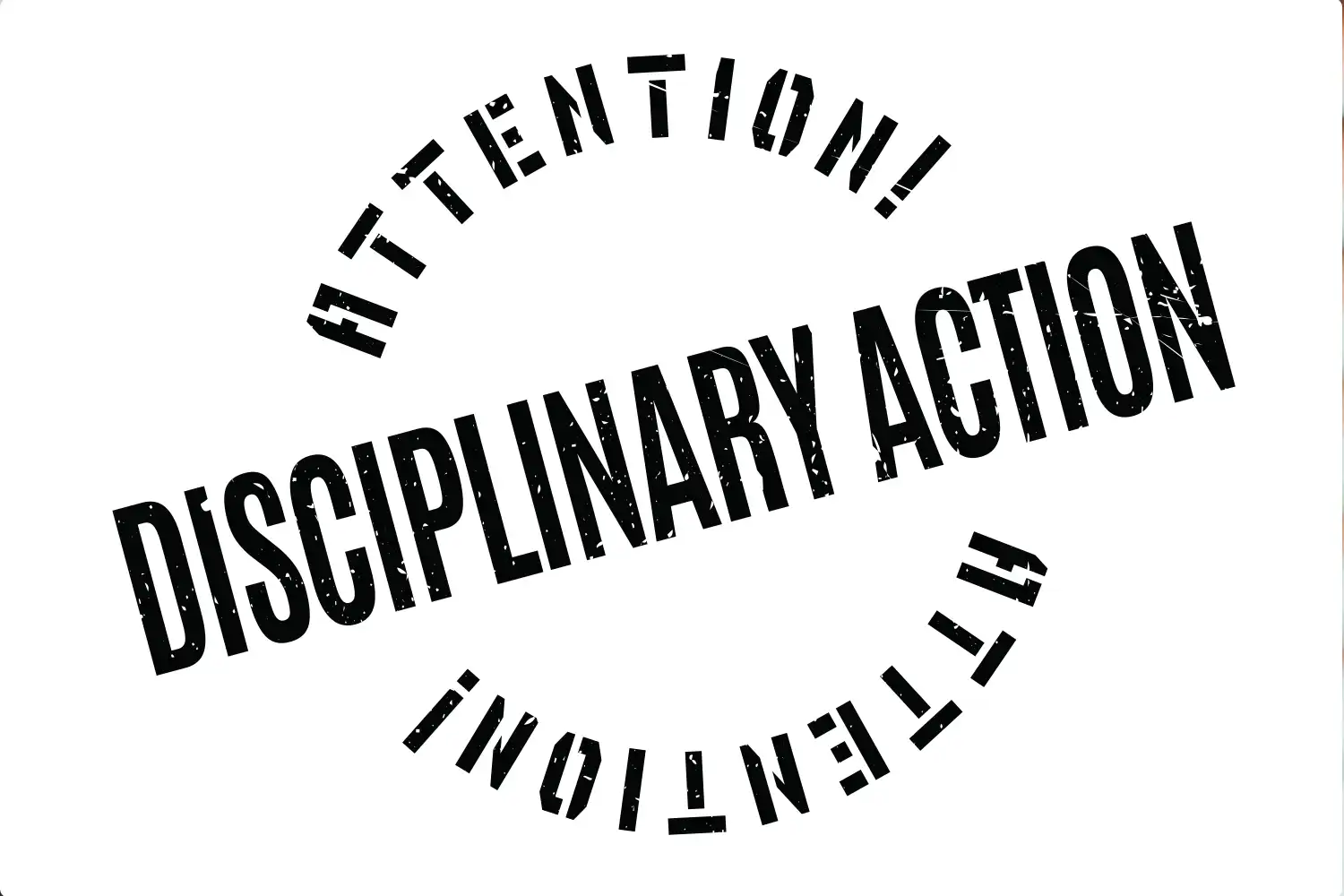Disciplinaries at work: a practical guide
Disciplinaries at work can be a stressful time for any employee. They can determine whether or not you continue in your job or are dismissed. If the reason for the disciplinary is not justified, or if your employer doesn’t handle the disciplinary process correctly or fairly, you could be entitled to financial compensation.
Rated 4.8 Stars in Over 1,000 Reviews
This page briefly discusses what disciplinaries at work are and what you should do if you find yourself on the receiving end of disciplinary action.

What is a disciplinary at work?
A disciplinary is essentially a punishment or remedial action taken against you by your employer. They may wish to take formal action against you if they are not happy with your performance or behaviour.
Issues to do with your performance are often also referred to as ‘capability’ issues – and perceived behavioural problems are also often referred to as ‘conduct’ issues which, if proven, are called ‘misconduct’.
Ideally, your employer’s goal should be to help you correct or improve what they consider to be your shortcomings. Unfortunately, some employers may seek to dismiss you sooner rather than later if they don’t think there’s scope for you to improve sufficiently in the time allotted.
Why might you get disciplined?
Performance and conduct shortcomings that lead to disciplinary action will to some extent, depending on your organisation.
Some examples are:
Poor performance
- Frequent errors in numeric/financial calculations
- Poor quality work
- Failure to meet agreed targets
- Failure to adhere to company procedures for carrying out a given task
Unacceptable conduct
- Consistent failure to observe time-keeping and/or time deadlines
- Being rude or disrespectful to your line manager/client/customer
- Telling lies
- Bullying, harassing or discrimination against colleagues
Should employers have a disciplinary policy and procedures?
It’s one of your employment rights to defend yourself against any misconduct allegations that your employer might make against you and – in order to defend yourself – to have access to your employer’s policies and procedures for dealing with disciplinaries.
To this end, your employer is required by law (Employment Rights Act 1996) to have a written document detailing their disciplinary policy and procedures.
Such a document is important as a means of ensuring fairness and consistency in carrying out disciplinaries across an organisation and would also be referred to if you took your disciplinary case to an employment tribunal.
What should a disciplinary policy contain?
Your employer’s disciplinary policy document will typically outline:
- What your employer’s policy is towards employee performance and/or behaviour that they consider unacceptable and therefore punishable by disciplinary action.
- What will happen if disciplinary action is taken against you
- What will happen before, during and after each stage in the overall disciplinary process.
- The kinds of disciplinary action that could be taken against you (see more on this below)
- Your right to appeal during the disciplinary process and the number of appeals you may make. (See below and our page on Appeals)
Many employers use the Acas code of conduct on disciplinaries as a basis for their own policy and procedures and you too may find it useful to have a look at this document.
Can you raise a grievance against disciplinary action?
You could raise a formal grievance early on in the disciplinary process on the grounds that the decision to proceed with disciplinary action against you was unfair, biased or not justified by your behaviour or performance.
If you did that, your employer might decide to combine your grievance with the disciplinary or possibly suspend the disciplinary until the grievance was resolved.
If the grievance went ahead separately from the disciplinary, the outcome could result in your employer dropping the disciplinary action. However, if your grievance was not upheld, the disciplinary would most likely proceed as originally intended.
Can you appeal against a disciplinary outcome?
If you dispute the disciplinary hearing outcome then you have a right to appeal against it. Examples of grounds for an appeal include:
- The punishment is too harsh in relation to the performance or conduct shortcoming
- The punishment is more severe than that given to a colleague in similar circumstances
- The decision to discipline you in the first place was unfair or bias
- Your employer’s disciplinary policy and/or procedures were not properly implemented
- You have new evidence to support your case.
See our guide on appeals for further detail.

What are the steps in a disciplinary action?
There are usually four main steps in a disciplinary process: Informal discussions, an investigation, a disciplinary hearing and outcomes, as discussed below.
A significant exception to this is where your conduct amounts to gross misconduct, in which case your employer can dismiss you without warning and without notice.
(See our guides on Notice periods and Wrongful dismissal and gross misconduct).
1. Informal discussions before disciplinary action
This is when your employer will informally raise the question of your unsatisfactory conduct or performance with you.
You may concede that your employer has reason to be dissatisfied with your behaviour/performance. However, you may also have a good excuse for it, whether it’s personal (eg health or relationship issues) or work-related (eg IT system problems or discrimination).
If that’s the case, you should explain the reason to your employer and if possible offer a timescale for resolving relevant personal issues.
If work-related problems can be readily overcome, then your employer could take steps to resolve them informally. However, if they are substantial, they would need to be investigated further. The same applies if you disagree with your employer’s allegations, or the allegations are serious.
2. Disciplinary investigation
If your employer considers there is still an issue following informal discussions with you, they should undertake an investigation into it. This will involve them collecting evidence to support what they perceive are your shortcomings.
Meantime, you should be collecting evidence to support your own case and also possibly raising a formal grievance with your employer, as outlined earlier.
3. Disciplinary hearing
When your employers have completed their investigation and if they find that you have a case to answer, they should write to you asking you to attend a disciplinary meeting – also called a disciplinary hearing – to talk about the matter.
In their letter, they should outline what performance or behavioural issue you are alleged to have committed; what their evidence is and possible outcomes.
You should also be given details about the hearing, such as where and when it will be held and your right to be accompanied by a ‘companion’ (normally a work colleague or trade union representative)
At this meeting, they should take you through their allegations and evidence and then give you a chance to ask questions, to respond to the allegations with any evidence you may have in your favour ( including any witness evidence).
4. Disciplinary hearing outcome
As soon as possible after the disciplinary hearing, your employer should inform you in writing of the outcome and – if they find you have a case to answer – of the steps that will be taken in an attempt to remedy the problem.
If the hearing finds that you don’t in fact have a disciplinary case to answer, then your employer should take whatever steps they can to help you get back to your normal work pattern, even to the extent of apologising (although they don’t have to!).

What if a disciplinary hearing finds against you?
If the disciplinary hearing finds that you have a case to answer, and if your appeal is not upheld, your employer will issue you with formal warnings about your conduct or behaviour.
Such warnings will include a timescale for your improvement and an indication of what could happen if you didn’t improve during the time allotted, as follows:
Verbal warning:
If the issue was not serious, your employer may decide that a verbal warning at an informal meeting will suffice.
They will seek to agree on a course of action with you so that you can improve. They will give you a timescale for improvement (typically three months) and they will ideally guide you on how to overcome the problem(s).
Although this is called a verbal warning, your employer will most likely keep a written note of it on your file. It will remain there for the duration of the warning. After that, it will be removed, providing that your behaviour/conduct has sufficiently improved.
First written warning:
If your behaviour or performance hasn’t improved adequately after a given time following a verbal warning, or if the disciplinary hearing finds that the issues are serious, you will be given a first written warning.
The warning letter should set out what the performance or misconduct issues are, what improvements you need to make and how much time you have to improve before further disciplinary action is taken – typically six months.
Final written warning:
You will be given a final chance to improve with a timescale (typically up to 12 months).
Dismissal
However, if you then fail again to meet the conduct/ performance improvements required, you will probably be told of your impending dismissal and given a letter terminating your employment
At every stage in the disciplinary process, a written note of the issues and actions agreed should be placed on your file and a copy given to you.
Further examples of disciplinary actions
In addition to the above warnings, and at any stage in the disciplinary process, your employer might also implement any of the following:
- A Performance Improvement Procedure/Plan or PIP (see our related guide)
- A pay cut, although only if your employment contract allows for it
- Loss of privileges (eg club membership, private health insurance) – although if these company benefits were contractual, removing them would have to be allowed by your contract
- Demotion, if allowed by your contract
- Suspension

Have you survived disciplinary action?
If you have survived the disciplinary action, your employer should tell you whether there are any conditions associated with your staying at work.
For example, is it dependent on a review after a specified time? How long will it be before any written disciplinary warnings get permanently removed from your file?
What can you do if you fail the disciplinary?
If you end up failing the disciplinary and are told you’re going to be dismissed, you may be able to make (another) appeal, depending on your employer’s policy about making appeals at this stage.
Is your dismissal fair or unfair?
If an appeal at this stage fails or is not permitted, the question about whether you are being fairly or unfairly dismissed becomes critical.
Your dismissal may well be fair If your employer:
- had good reason to believe in your shortcomings,
- used objective criteria to measure your progress,
- conducted the disciplinary procedure correctly and in a reasonable manner.
However, if you can honestly answer ‘no’ to any one of the following questions, then your dismissal may well be unfair:
- Did your employer offer you any kind of support and/or training to help you overcome your shortcomings?
- Does your employer have conclusive evidence about your failings?
- Were the procedures fair (eg were they biased against you because of your gender, race or some other reason?
- Were the procedures correctly followed?
If it seems that your dismissal might be unfair and if you are eligible to make a claim for unfair dismissal (see our guide on Unfair dismissal), you could follow either the negotiated settlement agreement pathway or the employment tribunal claim route. See our specialist guides – as highlighted – for further detail.
Next steps
If you are undergoing disciplinary action or have recently been through it and think that you were unfairly treated, Monaco Solicitors may be able to help you with a compensation claim.
We are well-established employment law specialists who only represent employees (not employers), so we do understand where you are coming from.
If you’d like a no-obligation consultation about your disciplinary case, contact us today:
- via our website here,
- phone on 020 7717 5259 or
- email communications@monacosolicitors.co.uk.